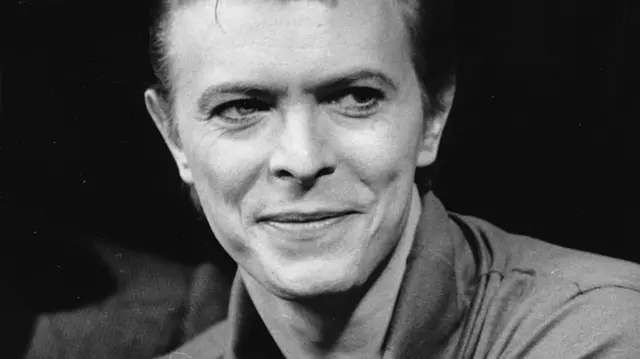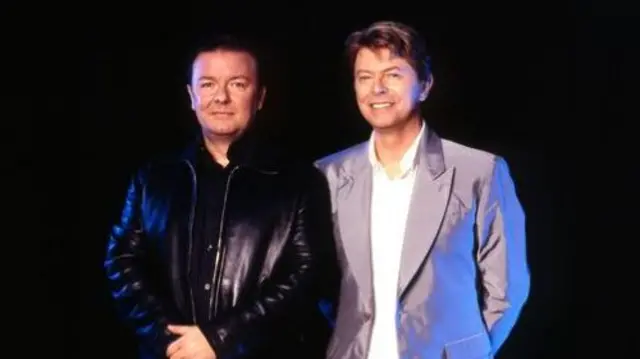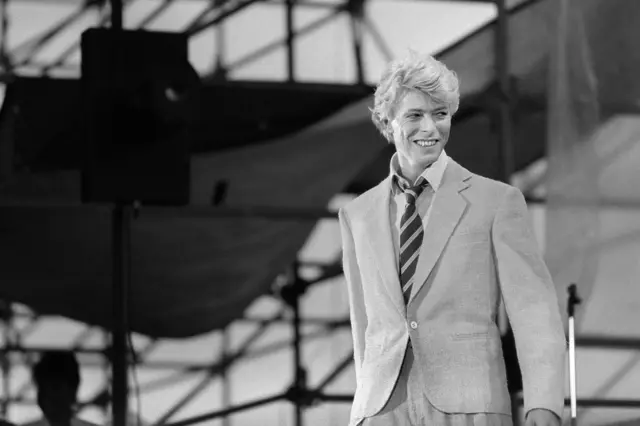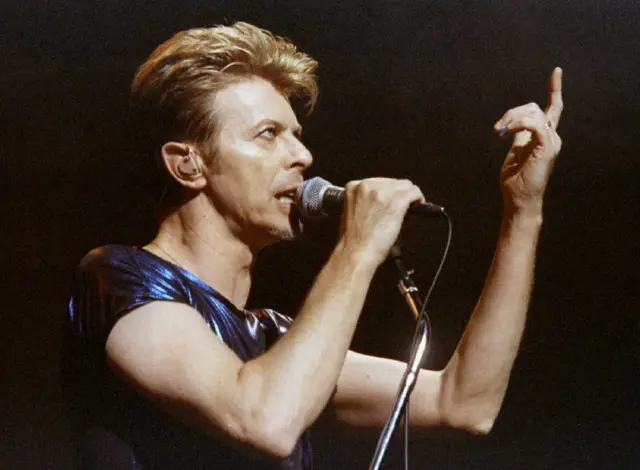The business of David Bowiepublished at 08:55
BBC arts editor Will Gompertz looks at the chameleon entertainer's influence as an artist
Will the real David Bowie please stand up? BBC arts editor Will Gompertz on the rock star.
David Bowie dies of cancer, spokesman confirms
His son Duncan Jones confirms his father's death on Twitter
Tributes flood in for singer, who died aged 69
All times GMT
Kev Geoghegan, Emma Saunders, Joel Gunter and Emma Ailes
BBC arts editor Will Gompertz looks at the chameleon entertainer's influence as an artist
Will the real David Bowie please stand up? BBC arts editor Will Gompertz on the rock star.
Allow X content?
This article contains content provided by X. We ask for your permission before anything is loaded, as they may be using cookies and other technologies. You may want to read X’s cookie policy, external and privacy policy, external before accepting. To view this content choose ‘accept and continue’.
Mark Savage
Music reporter
 Image source, AP
Image source, APToday's news is all the more shocking because David Bowie had recently emerged from suspended animation - revitalised and reinvigorated.
His two latest albums, The Next Day and Blackstar, ranked with his best, the former celebrating his past, the latter casting forward to the future. The fact he won't be there is heartbreaking.
But then Bowie's entire career has been a vanishing act. The son of a waitress and a nightclub owner, David Jones became David Bowie, who became Ziggy Stardust, who became the Thin White Duke. All of them were fictitious. All of them became iconic.
In the 1970s, he was restless, flitting between musical styles and personas, producing Lou Reed and The Stooges, and taking up painting in Berlin. His every move sparked impersonators and inspired musical sub-genres. He was the first post-modern pop star.
He struggled to remain relevant in the 1980s and 90s, but continued to push boundaries with the industrial rock of Outside and the drum and bass influenced Earthling. An enforced hiatus, prompted by an emergency angioplasty, took him out of the spotlight for most of the 2000s before that celebrated, unexpected comeback on his 66th birthday.
That late period of creativity may now be reassessed as the work of a musician who knew his time was running out. But it remains a fitting legacy for a man who subverted and reinvented pop time and time again.
Fresh from hosting the Gold Globes, comedian Ricky Gervais paid tribute to David Bowie:
Allow X content?
This article contains content provided by X. We ask for your permission before anything is loaded, as they may be using cookies and other technologies. You may want to read X’s cookie policy, external and privacy policy, external before accepting. To view this content choose ‘accept and continue’.

Bowie appeared in an episode of Ricky Gervais's sitcom Extras in 2006
 Image source, AFP/Getty Images
Image source, AFP/Getty Images"My entire career, I've only really worked with the same subject matter,'' Bowie told the Associated Press in 2002.
"The trousers may change, but the actual words and subjects I've always chosen to write with are things to do with isolation, abandonment, fear and anxiety - all of the high points of one's life.''
We all know the singer behind Changes, Life on Mars and Ashes to Ashes.
He was born David Robert Jones in Brixton, London, on 8 January 1947. He shares the same birthday as Elvis.
But given that The Monkees had a Davy Jones in their ranks, he changed his name to Bowie (and, in case you're wondering, it rhymes with Joey).
He emerged into the public eye early on: at the age of 17, he was interviewed on a BBC programme as the founder of The Society for the Prevention of Cruelty to Long-haired Men. He complained: "It's not nice when people call you darling and that".
One short video in particular is already doing the rounds online among those remembering the singer - it's a series of images drawn by the artist Helen Green and made into a video last year to mark his 68th birthday. It gives a clear idea of how Bowie changed his image over the years.
Allow X content?
This article contains content provided by X. We ask for your permission before anything is loaded, as they may be using cookies and other technologies. You may want to read X’s cookie policy, external and privacy policy, external before accepting. To view this content choose ‘accept and continue’.
 Image source, Reuters
Image source, ReutersDavid Bowie performing in 1995
Three years ago, aged 66, Bowie released his first new material in a decade, with little warning. The single Where Are We Now? and album The Next Day gained wide praise.
Only three days ago, he released another new album, Blackstar. It was well-received in the music press - Rolling Stone called it "one of the most aggressively experimental records the singer has ever made".
Allow X content?
This article contains content provided by X. We ask for your permission before anything is loaded, as they may be using cookies and other technologies. You may want to read X’s cookie policy, external and privacy policy, external before accepting. To view this content choose ‘accept and continue’.
The BBC's arts editor tweets...
Allow X content?
This article contains content provided by X. We ask for your permission before anything is loaded, as they may be using cookies and other technologies. You may want to read X’s cookie policy, external and privacy policy, external before accepting. To view this content choose ‘accept and continue’.
Allow X content?
This article contains content provided by X. We ask for your permission before anything is loaded, as they may be using cookies and other technologies. You may want to read X’s cookie policy, external and privacy policy, external before accepting. To view this content choose ‘accept and continue’.
Quote MessageIn the early 70s, when he discovered electronic music, it was an alien music, that really formed the sound of popular music to follow. It still sounds completely modern, and there's still incredible things to be discovered in it
Music critic Neil McCormick
We have a full profile of the life of the Thin White Duke, seen as one of the rock world's greatest ever pioneers - you can read more here.
The news of David Bowie's death was confirmed in a post on his official Twitter and Facebook feeds just before 06:30.
There was speculation online that the news was a hoax, but soon after, his son, film director Duncan Jones, posted his own tweet.